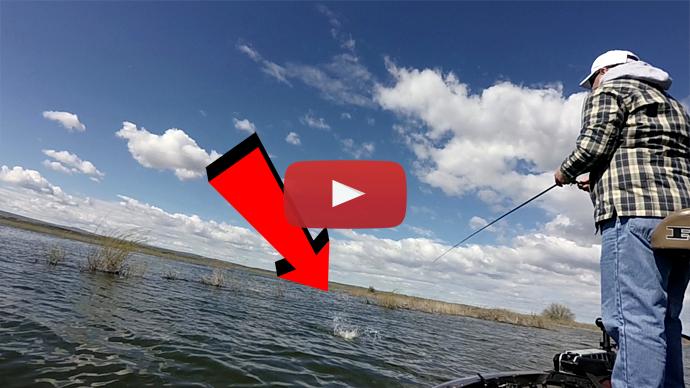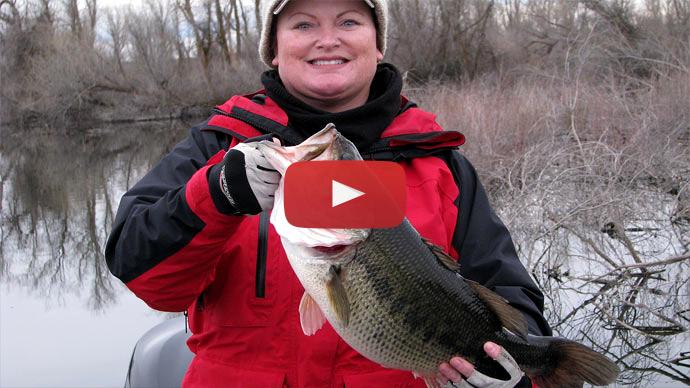What's up, everyone? It's pro professional Mike McClelland here to talk winter jerkbait fishing. And, you know, one thing about it, I don't ever lay a jerkbait down. I mean, you look in my boat and probably, you know, 11 months of the year I've got a jerkbait tied on somewhere in my boat, or there's gonna be a box of jerkbaits in my boat, and winter is no different. I mean, one thing about it, to me, wintertime is probably the time that you're most apt to catch the biggest bass of the year that you're gonna catch, and there's a couple reasons for that. I mean, number one, in my opinion, is just the lack of pressure. Our lakes and creeks and rivers and streams these days have become so busy that these fishes get a tremendous amount of pressure. And when you get out there in the winter, I mean, a lot of days you can be out there all by yourself if you pick the right day and it's not that hard.
And to me, wintertime jerkbait fishing, it's a slow, methodical process, but it's one of those situations that you're apt to catch, you know, 5 that will weigh 25 pounds if you're fishing right body of water, and your opportunity to catch an 8 or 10-pounder might be better then than it's ever been throughout the course of the year.
The big thing about wintertime jerkbait fishing is understanding that these fish are cold-blooded, understanding that these fish are not gonna move fast to get a bait. And you know, and when I talk about that I'm talking about more in the Midwest. You know, if you're talking about wintertime fishing in Florida or wintertime fishing deep in the south, it's a little bit different. But those fish still are probably the most lethargic that they are in any other time of the year.
And my number one choice for wintertime fishing is gonna be either this new McStick 110 plus 1 or the McRip 85. And the reason for that is typically in the winter, I mean, those fish are gonna be at the deepest stage that you can probably reach them with a jerkbait.
It'll still astound a lot of you how shallow and how many fish don't ever go deep. I mean, they stay shallow relatively all year long and those are the fish that you're really fishing for with the jerkbait in the winter, those fish that live in the rivers, that live in the backs of creeks, those fish that just... the resident fish. They're not mainlake fish that migrate around and move a lot, those fish just live there. And once you determine, you know, the right places to catch him, it can really be pretty easy and you can find them really grouped up. That's the cool thing about wintertime jerkbait fishing is the simple fact that when you find a school of them, you generally aren't gonna pick one or two off. You're gonna catch four or five out of the same tree, or out of the same little creek channel bend, or maybe off of a point that's got a creek swinging right up close to it.
One of the biggest keys to me in the wintertime for being successful throwing a jerkbait is, number one, being, you know, slow, taking your time. Don't get in a hurry. I mean, pick an area of the lake and just really focus in on it and don't try to cover a lot of water. You gotta pay close attention to, like I said, your electronics, making sure that you're fishing in area that has a lot of baitfish in it. And once you determine where those baitfish are positioned and what depth the baitfish are positioned at, it's gonna really clue you in to how you need to be fishing for them. If you're seeing fish that are suspended in treetops... I mean, that's probably my favorite way to catch him in the winter is those fish that suspend up in treetops just kind of hanging out. They're taking advantage of those sunny days where they get the warmth of the sun and they're just kind of being lazy and hanging out there, and a bait like the 110 plus 1 and the McRip 85 are gonna be my two best choices for wintertime jerkbait fishing.
When it comes to wintertime jerkbait fishing, that is the time of the year that I definitely am gonna make sure that my bait actually is sinking just a little bit, and it's easy to do. I mean, all you have to do is just, you know, take your bait, just pitch it over the side of the boat, pull it down, stop it, and you wanna put enough weight on that bait so it actually slowly sinks in a water column, and when I say slowly I'm talking about it may fall a foot in 30 seconds, but you definitely don't want that bait to rise and you're gonna be a lot more successful catching them on a jerkbait.
There's a couple of different ways you can accomplish this. Most of the baits, I mean, they're built to suspend, but the water temperature is gonna affect how buoyant this bait is. If the water is super, super cold, it's gonna take a little bit less weight to get that bait to suspend. As that water temperature warms up a little bit, the bait is gonna become more buoyant, the water becomes less dense, and the bait tends to float up a little bit so you may have to add a little bit more weight.
I typically like to start by adding a bigger hook. The baits come with number five round-bend Gamakatsus, and I like to start on the front with a number four. If the bait isn't quite heavy enough, I'll move to the middle with a number four, and if I have to, I'll go to the rear with a number four, and that generally somewhere in that hook change process. You'll find that happy medium where that bait will truly suspend.
The big key I think there is you've gotta make sure that bait... Whether it's a 110 plus 1 or the 110, you gotta make sure those baits are suspending proper in the water column. The biggest reason for that is fish are cold-blooded, I mean, they're not gonna move any faster than that water temperature is gonna allow or want them to move. I mean they've been in, you know, upper 30-degree water and they're not gonna get after it. So the suspending characteristic of this bait is gonna allow you to hover the bait right in front of these fish.
I've used the analogy so many different times that, you know, if you just ate a dinner and you're pretty full and somebody hollers at you, "Hey, I got a plate of cookies. You want one?" You're probably gonna turn it down. But even if you're full and somebody comes up and waves that plate of cookies in your face and just kind of hangs it there, you're probably gonna think about reaching out there and getting one, and that's the same way I feel like a stick bait works on a bass.
When you pull that stick bait down and you stop it and you let it sit there and you count to 5 to 10 to 15, the longer that bait sits there and intrigues that bass, then you give it a little twitch or a nudge, that bass is eventually gonna reach out there and get it. So that's kind of my analogy of why you want that bait to suspend.
Another thing that I have really noticed over the years of fishing jerkbaits in the winter is generally more opaque colors work a lot better in the wintertime. I just think when that water gets cold and those fish are lethargic, you even notice that baitfish even their color becomes more pale. So colors like Norman Flake and Dirty Bone, colors that have a more opaque finish, I think work a lot better sometimes in the wintertime, unless you're just fishing super gin-clear water and water that you don't have much wind, you don't have much chop on the water. Those are gonna be the scenarios where I do stick with the translucent colors a little bit more. But anytime you get cold, just off-colored water, opaque-colored baits are gonna be a real key.
Wintertime jerkbait fishing is... Again, equipment becomes so critical. I'm never gonna throw a jerkbait in the wintertime on anything faster than a five to one gear ratio reel. I mean, I love this Bass Pro Shop reel, super reel for making yourself slow down. And in the winter, I'm probably gonna use the lightest line that I'm ever going to use through the course of the season. The fish don't have a lot of spunk to them. Even 8 or 10-pound fish, I'm not scared to land on 8 or 10-pound Sunline FC Crank, or even Sunline Supernatural Monofilament, because you're gonna be able to get the bait down deeper, you're gonna be able to fish the bait a lot more effective, slower when you're pausing that bait. A really soft rod. You know, I mentioned earlier, a jerkbait rod can be anywhere from about 6'6" to 7 foot. I like a medium to a medium-light action. I love the Falcon Jerkbait Rod in the Expert Series.
And focus on real specific places, isolated brush pile or one tree that sets out on a point, or a point that has a real defined creek channel or drop, and I think you're gonna be a lot more effective catching fish on a jerkbait this winter.
BassResource may receive a small portion of revenues if you make a purchase using a link above.



